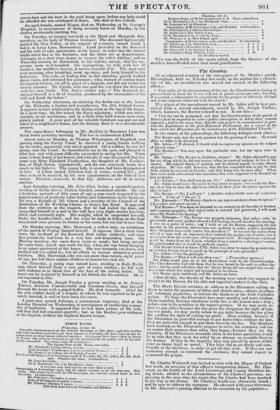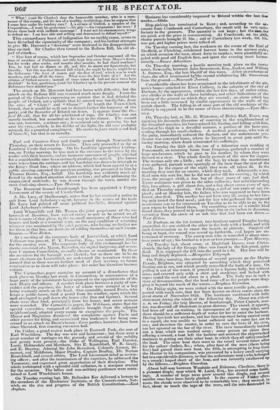Sir Charles Wetherell was invited to dine with the Mayor
of Oxford last week, on occasion of that officer's inauguration dinner. Mr. Har- co art, on the health of the Lord Lieutenant and County Members be- ing drunk, alluded to the circumstance of Sir Charles's presence, ex- pressing at the same time his regret that Sir Charles had been insulted in his way to the dinner. Sir Charles's health was afterwards drunk ; and he rose to address the company. He adverted with great bitterness to Mr. Harcourt's passing allusion to his reception by the populace—. " What ! (said Sir Charles) doe's the honourable member, • who is a-come moner of this county, and the eon of a wealthy Archbishop, does he.suppose that I come here under his tetelary care? I, a cit izen of Oxford, a member of the Corporation—I want his protection !—his pity !—his con passion! his tears! I throw them back with ineffable contempt ! I want not his eleemosynary wings' to defend me: I am here able and willing and determined to defend myself!"
This extraordinary burst Of indignation for no earthly cause, seems to have disturbed the equanimity of the company; and his further attempts to give Mr. Harcourt a "dressing" were drowned in the disapprobation they excited. Sir Charles then turned to the Reform Bill, his old ob- ject of attack- " That feast of reason, which last September and October engrossed all the time of members of Parliament, not only kept him away from Mayor's feasts, but for weeks after weeks, and mouths after months, he had dined nowhere? Yes, he had had no dinner at all, and this he meant not figuratively, but literally. Yet this was that blessed Bill which, for aught he knew, might be to the Reformers the feait of reason mid the flow of soul,' which was to work wonders, and take off all the taxes. What were the first fruits of it? Let the citizens of Oxford answer ; instead of taxes taken off, had not their taxes been doubled? In fact, gentlemen, (said Sir Charles) up to the present moment the Reformers have deluded you."
The attack on Mr. Harcourt had been borne with difficulty, but the attack on the Reform Bill was resented much more deeply. From the period of Sir Charles's expressing an opinion that it had deluded the people of Oxford, not a syllable that he uttered was intelligible, from the cries of " Chair!" and " Shame !" At length the Town-Clerk hinted, that it would be well not to disturb farther the harmony of the party, and the Recorder of Bristol sat down. It appears from the Ox- ford Herald, that for all his whirlwind of rage, Sir Charles was not merely insulted, but assaulted on his way to the dinner. The assault was not, however, a serious one ; it consisted only in pressing his hat over his eyes,—wlich, in his dislike of the light, the old man probably mistook for &practical compliment. Ile seems to_have made a sad fool of himself; but that is no novelty.




























 Previous page
Previous page